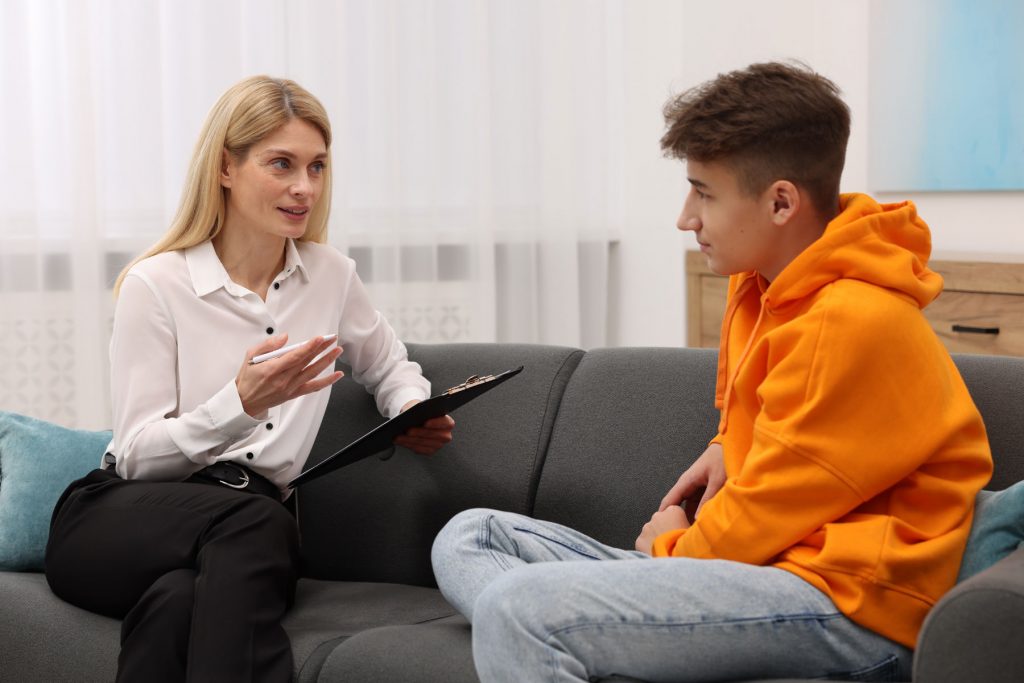Negative body image is a common source of stress that fuels eating disorders. The negative perceptions your teen feels about their body can cause disordered eating patterns that impact their health and happiness. Addressing negative body image through therapy can help reframe how your teen views their body so they can move forward with more confidence.
We take a comprehensive approach to adolescent eating disorder treatment at Family First. Teens and families both receive support to work on body image, healthier eating, mental health, and empowering environments. Call 888.904.5947 to find help at our South Florida center.
Body Image Is Powerful
Your teen has likely held ideals about body image for longer than they could communicate them. Body image doesn’t just encompass how you look but how you move, interact with the world, and take up space. These are crucial parts of living, affecting everything you do and how you think about doing it. Gaining perceptions about body image, though, can also cause young children to adopt stereotypes about how they feel they should look, which can lead to perfectionism and body dissatisfaction.1
As children grow through adolescence and teenage years, outside influence can reinforce negative body image. Social media, peer pressure, and media portrayals of “ideal” bodies can all contribute to a distorted view of one’s own body. Additionally, sports with weight classes or emphasis on body shape and size can also exacerbate negative body image.
Body Dissatisfaction Can Lead to Disordered Eating
Disordered eating is a spectrum that includes unhealthy and extreme eating habits, such as bingeing, purging, restricting food intake, and over-exercising. These behaviors often arise from negative body image and can quickly escalate into full-blown eating disorders if not addressed. Just because someone engages in disordered eating does not mean they have an eating disorder. Eating disorders are complex mental health conditions that are often hallmarked by disordered eating.
Body dissatisfaction does not play a major role in all eating disorders but is often a characteristic of anorexia and bulimia nervosa.
- Anorexia nervosa – Body dissatisfaction—to the point of distorted body image—often leads people with anorexia nervosa to restrict how much they eat. They are often scared of gaining weight even though they may be severely underweight.
- Bulimia nervosa – Individuals with bulimia nervosa cycle through periods of bingeing food and then purging (forcing themselves to throw up, abusing medications, fasting, or excessively exercising) to try and make up for what they ate. Body image is often a major driver of binge/purge cycles.
Eating disorders are serious and can be extremely dangerous. Teens with eating disorders may have an even harder time separating their ideal body image from a healthy one due to the constant comparison they face on social media and in their daily lives. This is why seeking help through therapy is crucial to addressing negative body image and promoting a healthier relationship with food and one’s own body.
How Therapy Can Help with Body Image
Talk therapy—also known as psychotherapy—can help teens with body image issues accept how they look and nourish themselves. Many therapists rely on cognitive-behavioral approaches to help teens address their deep-rooted feelings while addressing disordered eating behaviors.
Recognizing Thoughts and Feelings
Therapy helps teens recognize the patterns of their thoughts and feelings that may lead to disordered eating. Teens may feel like they aren’t thin, muscular, or pretty enough. As they try to attain their desired body image, they become consumed by food and exercise habits that can quickly turn unhealthy. Licensed therapists work with teens to explore these feelings, which may not be easy to recognize alone.
Reframing Negative Body Image
After identifying the negative thoughts and feelings that contribute to their distorted body image, teens work with their therapist to reframe these thoughts and replace them with more positive, realistic ones. This process takes time but can help teens develop a healthier perception of their bodies and reduce negative behaviors around food.
Building Self-Esteem
Therapy also focuses on building self-esteem in teens by helping them recognize their strengths, talents, and worth beyond just physical appearance. By emphasizing qualities such as kindness, intelligence, creativity, and resilience, therapists can help teens see the value in themselves beyond their body’s size and shape.
Creating Healthier Habits
In addition to addressing negative body image, therapy can also help teens develop healthier habits around food and exercise. By working with a therapist, teens can learn to nourish their bodies in a balanced way that promotes physical and mental well-being rather than focusing on achieving an unrealistic body ideal.
Reconnecting with Family
Disordered eating can interfere with healthy family interactions and relationships. Family therapy can help rebuild bonds, helping parents gain an understanding of the stress their teen has felt and teens recognize that they are worthy of love and support.
Every teen who engages in therapy for body image issues will have a different experience, but the goal is always to help them develop a more positive relationship with food, their bodies, and themselves.
Get Help by Calling Family First Adolescent Services
If your teen struggles with negative body image and disordered eating, we can help. We offer specialized programs for teens 12-18. Our residential boys-only program provides 24/7 support that helps get to the root of your son’s struggles. The day program at our Palm Beach Gardens, FL, center provides support for boys and girls of the same age group, allowing them to go home at the end of treatment each day.
Help your teen discover a healthier relationship with their body. Contact our team online or at 888.904.5947 to get started.
Footnotes:

